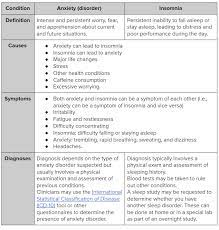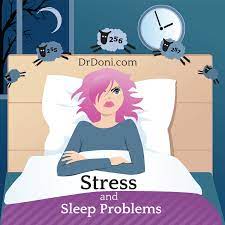Insomnia and Anxiety: Understanding the Connection
Insomnia and anxiety often go hand in hand, creating a challenging cycle that affects both our mental and physical well-being. Insomnia, the difficulty in falling asleep or staying asleep, can be caused by various factors, with anxiety being one of the most common triggers.
Anxiety is a natural response to stress or perceived threats. However, when anxiety becomes chronic or overwhelming, it can disrupt our sleep patterns. The racing thoughts, constant worrying, and physical symptoms associated with anxiety make it difficult to relax and fall asleep peacefully.
On the other hand, lack of sleep due to insomnia can exacerbate anxiety symptoms. When we are sleep-deprived, our brain’s ability to regulate emotions is compromised. This makes us more susceptible to feeling anxious or overwhelmed by everyday stressors.
The Vicious Cycle
The relationship between insomnia and anxiety often forms a vicious cycle:
- Anxiety disrupts sleep: Persistent worries and racing thoughts make it challenging to calm the mind before bedtime.
- Insomnia increases anxiety: Lack of quality sleep leads to heightened irritability, decreased concentration, and increased susceptibility to stressors.
- Anxiety worsens insomnia: As anxiety levels rise due to lack of sleep, falling asleep becomes even more difficult.
- Poor sleep affects daily functioning: The lack of restorative sleep impairs cognitive function, emotional stability, and overall well-being.
Tips for Managing Insomnia and Anxiety
Fortunately, there are strategies that can help break the cycle of insomnia and anxiety:
- Create a bedtime routine: Establish a relaxing routine before bed to signal to your body that it’s time to unwind. This may include activities such as reading, taking a warm bath, or practicing relaxation techniques.
- Avoid stimulating substances: Limit your intake of caffeine, nicotine, and alcohol, as they can interfere with both sleep quality and anxiety levels.
- Practice stress management techniques: Incorporate stress-reducing activities into your daily routine, such as meditation, deep breathing exercises, or engaging in hobbies you enjoy.
- Create a sleep-friendly environment: Ensure that your bedroom is quiet, dark, and at a comfortable temperature. Consider using white noise machines or earplugs if necessary.
- Seek professional help: If insomnia and anxiety persist despite self-help strategies, it’s important to consult with a healthcare professional or therapist who specializes in sleep disorders and mental health.
The Importance of Seeking Support
If you are struggling with both insomnia and anxiety, remember that you are not alone. Many people experience these challenges and find relief through various treatment options. Seeking support from healthcare professionals or therapists can provide guidance tailored to your specific needs.
By addressing both insomnia and anxiety together, you can break the cycle and improve your overall well-being. Remember to be patient with yourself throughout the process and prioritize self-care as you work towards better sleep and reduced anxiety levels.
Understanding and Managing Insomnia and Anxiety: Practical Coping Strategies, Causes, and Connections
- What are 3 practical coping mechanisms for insomnia?
- How do I stop anxiety and insomnia?
- Is insomnia a symptom of anxiety?
- What causes anxiety induced insomnia?
What are 3 practical coping mechanisms for insomnia?
When it comes to coping with insomnia, there are several practical mechanisms that can help improve sleep quality. Firstly, establishing a consistent bedtime routine is crucial. Going to bed and waking up at the same time every day, even on weekends, helps regulate the body’s internal clock and promotes better sleep. Secondly, creating a sleep-friendly environment is important. Keeping the bedroom dark, quiet, and at a comfortable temperature can enhance relaxation and promote restful sleep. Lastly, managing stress through relaxation techniques such as deep breathing exercises or meditation can help calm the mind and prepare it for sleep. By incorporating these practical coping mechanisms into your daily routine, you can take proactive steps towards managing insomnia effectively.
How do I stop anxiety and insomnia?
If you’re wondering how to stop anxiety and insomnia, there are several strategies you can try. Firstly, establishing a consistent bedtime routine can help signal to your body that it’s time to relax and prepare for sleep. Avoiding stimulating substances like caffeine, nicotine, and alcohol can also make a difference in reducing anxiety levels and improving sleep quality. Additionally, practicing stress management techniques such as meditation or deep breathing exercises can help calm your mind before bed. Creating a sleep-friendly environment by ensuring your bedroom is quiet, dark, and at a comfortable temperature is also crucial. If self-help strategies aren’t effective, seeking professional help from healthcare professionals or therapists who specialize in sleep disorders and mental health can provide further guidance tailored to your specific needs. Remember that addressing both anxiety and insomnia together is important for breaking the cycle and improving your overall well-being.
Is insomnia a symptom of anxiety?
Yes, insomnia can be a symptom of anxiety. Anxiety often disrupts our sleep patterns, making it difficult to fall asleep or stay asleep. The racing thoughts, constant worrying, and physical symptoms associated with anxiety can create a state of hyperarousal that interferes with our ability to relax and achieve restful sleep. On the other hand, lack of sleep due to insomnia can worsen anxiety symptoms, leading to a vicious cycle. Addressing both insomnia and anxiety is crucial for improving sleep quality and overall well-being. Seeking professional help can provide guidance and support in managing these interconnected issues effectively.
What causes anxiety induced insomnia?
Anxiety induced insomnia occurs when the symptoms of anxiety, such as racing thoughts, restlessness, and worry, interfere with our ability to fall asleep or stay asleep. The connection between anxiety and insomnia is complex and multifaceted. Anxiety triggers a heightened state of arousal in our body, making it difficult to relax and unwind before bedtime. Additionally, the constant worrying and rumination associated with anxiety can keep our minds active even when we are physically exhausted. The resulting lack of sleep further exacerbates anxiety symptoms, creating a vicious cycle. It’s important to address both the underlying anxiety and the sleep disturbances to effectively manage anxiety induced insomnia. Seeking professional help and implementing relaxation techniques can be beneficial in breaking this cycle and improving sleep quality.



